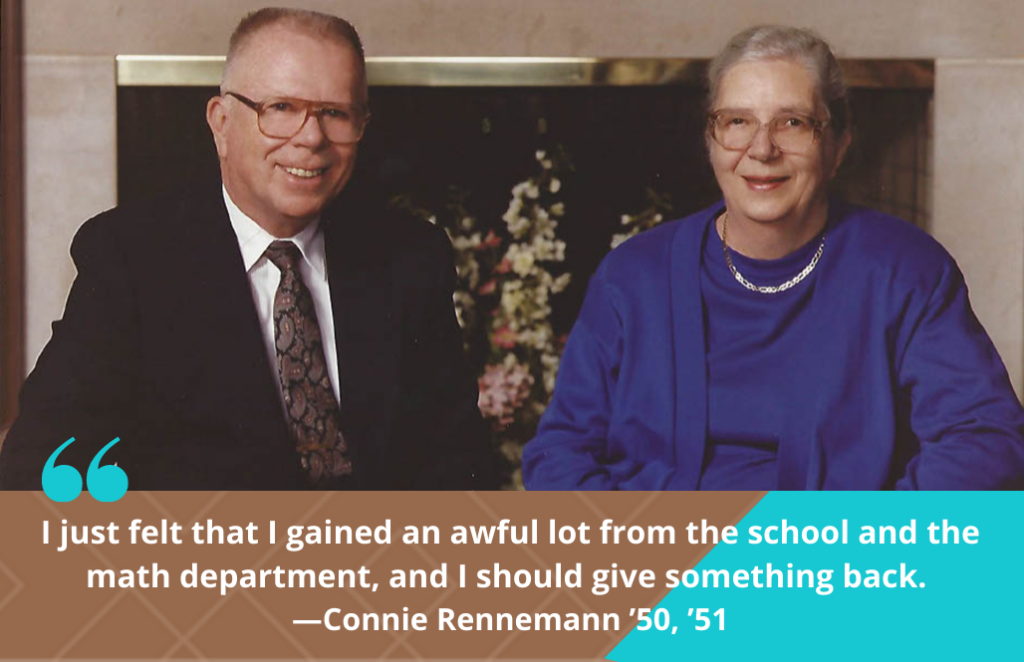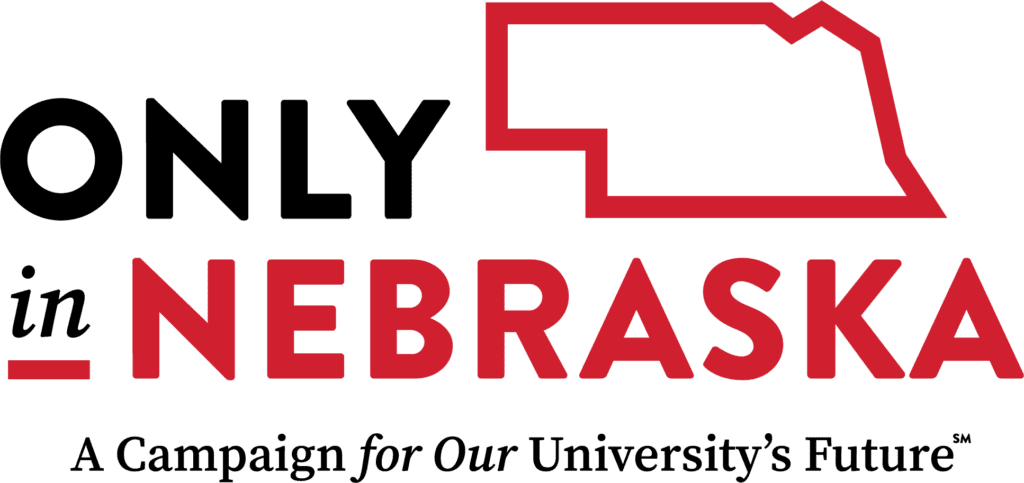A Husker by luck, Connie Rennemann gives back for 64 years


An expanded search for a college to attend would lead New Yorker Conrad “Connie” Rennemann Jr. to the University of Nebraska–Lincoln. With colleges and universities in the eastern section of the country quickly filling up after WWII, he boarded a train and headed west.
His experience at Nebraska was meaningful – from playing in the Cornhusker Marching Band to the support he received from faculty members who cared about his education and career.
Now hailing from Dayton, Ohio, Connie has made annual gifts to the UNL College of Arts and Sciences Department of Mathematics since 1957, starting just six years after completing his studies. He received a bachelor’s and master’s degree from Nebraska, majoring in chemistry and math and math and physics respectively.
Connie met his wife, Annette (Luebbers) Rennemann, a dietetics major, at the university. She came to the university from Iowa but was born in Osmond, Nebraska. They married in 1952 and had a son, Ed, and a daughter, Ann. Annette died in 2011; the Rennemanns were married for 59 years.
In 1999, the couple established the Rennemann/Luebbers Scholarship in Mathematics at the University of Nebraska Foundation to provide annual tuition aid to students who live outside of Nebraska who wish to study mathematics at UNL. We asked Connie Rennemann about his time at Nebraska, his career and giving back.
You must have felt that the University of Nebraska was a good fit as you have a bachelor’s and a master’s degree from UNL. Why did you decide to attend Nebraska?
Well, it was a consequence of World War II. I was born and raised in Mount Vernon, New York, and graduated from high school in 1946. I thought I was going into the army, but they stopped drafting about the time I graduated, and I had not applied for college. So, all the eastern schools were flooded with GIs coming back from the war. I started applying further away, and Nebraska was one of the schools I was accepted at. And frankly, I liked their catalog better than any other school. So, I climbed on a train and headed to Nebraska.
You have supported the Department of Mathematics since 1957. This has helped provide it stable support over the years. What interested you in giving, and why have you kept it up?
Annette and I visited Lincoln in 1999 and met with the math department chairman to discuss the needs of the department. It turned out he was interested in attracting out-of-state students, and we agreed to set up a scholarship for out-of-state students. I just felt that I gained an awful lot from the school and the math department, and I should give something back.
What are some of your favorite memories of your time at Nebraska?
I was a baritone horn player in high school and earlier for a lot of years, so I went to talk to Don Lentz who was the director of bands. I gave him a little demonstration of playing, and he said, “You’re in.” So, I started playing in the Cornhusker Marching Band and the concert band for five years. I was the first-chair baritone horn player, and that was a very pleasant experience I enjoyed very much.
And what memories do you have of your time studying in the Department of Mathematics?
I started out studying chemical engineering, but after roughly the first year I decided that an engineer wasn’t me, and I switched to chemistry and math as a double major. The first important memory was when I was a first semester sophomore. Professor Dr. Edwin Halfar asked if I would like to grade papers, and I said, sure. So, that was the start of a relationship with the math department through the years. I worked for a number of professors. Eventually, I was working for Dr. Miguel Basoco, the chairman of the department. I appreciated the opportunities and the treatment that I received. The reason I wanted to fund a scholarship was because I appreciated what this department had done for me and what the people had done in helping me.
What are some highlights of your career after completing your studies at Nebraska?
When I graduated, I went to work for what is now NASA. They hired me as an aeronautical research scientist, and I worked on theoretical aerodynamics. I was with a small group, and it was a good foundation and learning experience.
Then, in 1955 I started looking for another position. I accepted one with the Republic Aviation Corporation in Long Island, New York, where I worked for about 23 years. Mostly, in the early days there, I was still in aerodynamics. I then started an operations research sister organization, which I ran. In 1961 the company sent me to Harvard Business School for 16 weeks, and eventually I was head of new business for the company, then assistant to the president, then vice president, director of administration and so forth.
In 1978 I accepted a position in Tennessee with an engineering company that was a principal contractor for the government at a government test facility. I was vice president of the company, and we had about 3,000 employees. I became deputy general manager and, ultimately, was chief operating officer and executive vice president when I retired in 1991.
When you graduated you probably didn’t imagine you’d be a business executive and lead companies?
No, no. I was always a one-step-at-a-time type of person. Do your job, try to do it as well as you can, and things will fall in place for you.
Would you say the university prepared you for success in your career?
Oh, definitely. It helped not so much with the detailed knowledge as it did with the training to think and to analyze problems and so forth. That was key. In the early years, I was heavily using mathematics, so the training in math helped a lot. The future required less technical knowledge, put it that way.
Is there anything else you’d like to share?
I learned to play bridge at Nebraska, and it’s been a side passion my whole life. I played bridge competitively over the years. When I retired, my wife played with me as partners, and I’m probably currently ranked in about the top 10% of bridge players in the country. It’s a challenging game but is something I’ve enjoyed.





